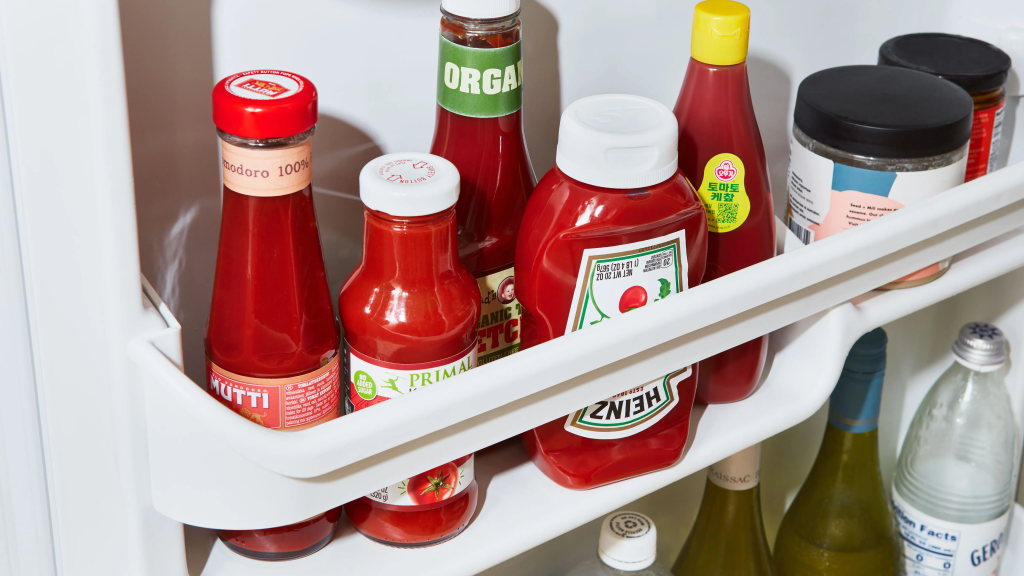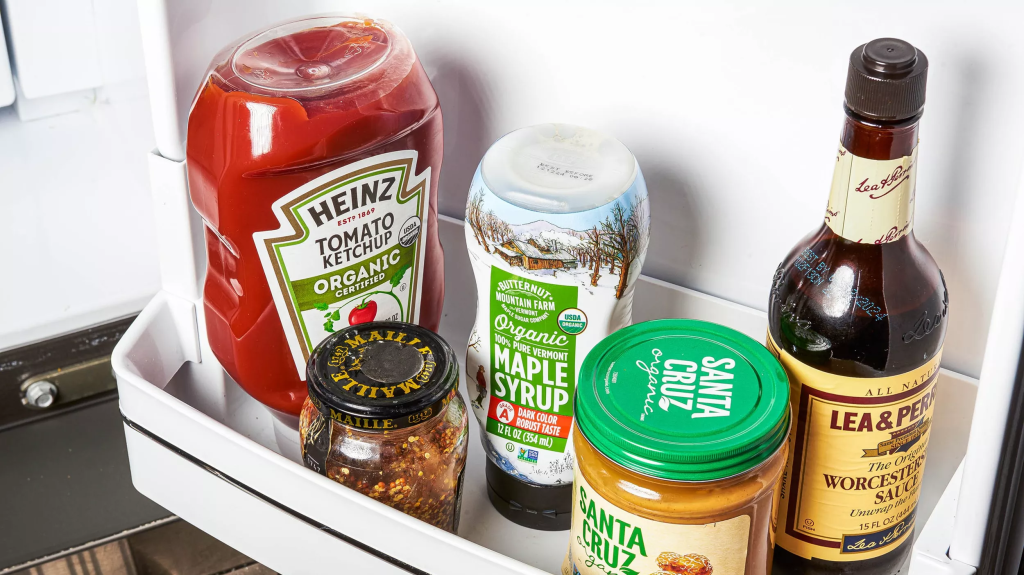Few kitchen debates spark as much disagreement as the question of where to store ketchup. Some people argue that keeping it in the fridge preserves its freshness and flavor, while others believe it belongs in the pantry since it has natural preservatives.
So, who is right? Should ketchup be cold or at room temperature? To settle this debate, let’s explore the science behind ketchup’s ingredients, expert opinions, and consumer habits.
Understanding Ketchup Ingredients and Its Shelf Stability

Ketchup is made from tomatoes, vinegar, sugar, salt, and spices. Each of these ingredients contributes to its preservation and storage properties.
- Tomatoes and vinegar create an acidic environment that helps prevent bacterial growth.
- Sugar and salt act as preservatives, further extending shelf life.
- Spices and thickeners add flavor and consistency but do not significantly impact its stability.
Because of its acidity and preservatives, ketchup is naturally resistant to spoilage, which is why many believe it does not require refrigeration. But does that mean it is safe to leave it out indefinitely?
The Case for Storing Ketchup in the Fridge
Those who prefer to refrigerate ketchup highlight several benefits.
First, refrigeration helps extend its shelf life. Keeping ketchup cold slows down spoilage and oxidation, allowing it to remain fresh for months after opening.
Second, it maintains flavor and texture. Refrigerated ketchup retains its original taste, consistency, and color, preventing it from becoming too runny or developing an off-flavor.
Third, it prevents bacteria and mold. Although ketchup’s acidity slows bacteria growth, refrigeration further reduces the risk of contamination and spoilage.
According to the United States Department of Agriculture, refrigerating ketchup after opening is recommended to ensure maximum freshness and safety. Many food manufacturers also print refrigerate after opening on their ketchup bottles.
If ketchup is not used frequently, refrigeration is the best way to keep it fresh for as long as possible.
The Argument for Keeping Ketchup in the Pantry
On the other hand, some people insist that refrigeration is unnecessary. They point to ketchup’s high acidity and preservatives, which naturally protect it from bacteria.
Restaurants leave ketchup on tables for hours or even days without refrigeration, and before modern refrigeration, ketchup was always stored at room temperature.
Additionally, storing ketchup in the pantry keeps it at a smooth, pourable consistency. Many people prefer room-temperature ketchup because refrigerated ketchup can be thick and harder to spread.
If a bottle of ketchup is used quickly, such as within a few weeks, pantry storage is unlikely to cause any safety concerns.
Expert Opinions on Ketchup Storage

Food safety experts generally recommend refrigerating ketchup, especially for long-term storage. However, they also acknowledge that keeping an opened bottle in the pantry for short periods is not necessarily dangerous.
Some chefs and culinary experts suggest that the decision depends on personal preference. If ketchup is consumed quickly, pantry storage is fine. If it sits in the kitchen for months, refrigeration is the safer option.
The official stance of Heinz, one of the most well-known ketchup brands, is that ketchup is shelf-stable but should be refrigerated after opening to maintain the best quality.
How Storage Affects Ketchup’s Taste and Quality
Storage conditions can influence the taste and texture of ketchup.
Refrigeration helps preserve the tangy, fresh flavor and keeps it from becoming watery over time. However, some people dislike the thicker consistency of cold ketchup and prefer the smoother texture of room-temperature ketchup.
Pantry storage may slightly alter ketchup’s flavor and consistency over time, but many people do not notice a significant difference if it is used quickly.
Health and Safety Considerations

From a food safety standpoint, refrigeration is the best way to prevent potential spoilage. Cold temperatures slow bacterial growth and oxidation, reducing the risk of foodborne illness.
That said, ketchup is not highly perishable. Even at room temperature, it can remain safe for several weeks after opening, provided it is stored properly with the cap tightly closed.
For households that go through ketchup quickly, leaving it in the pantry is unlikely to cause harm. However, for those who use ketchup less frequently, refrigeration ensures it remains safe and fresh for longer.
Conclusion: The Best Way to Store Ketchup
Whether ketchup should be stored in the fridge or the pantry depends on personal preference, consumption rate, and safety concerns.
Refrigeration is ideal for those who use ketchup occasionally and want to maintain freshness for an extended period. On the other hand, if a bottle of ketchup is used up within a few weeks, keeping it in the pantry is a convenient and acceptable option.
Ultimately, both methods can work, and the choice comes down to what fits best with an individual’s lifestyle and taste preferences.


